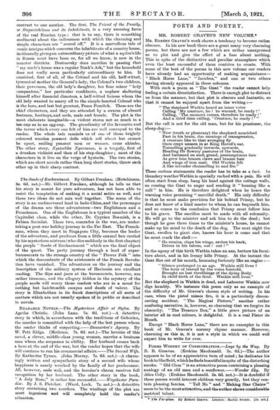POETS AID POETRY.
MR. ROBERT GRAVES'S NEW VOLUME.*
MR. ROBIrRT GRAVES'S work shows a tendency to become rather
obscure. In his new book there are a great many very charming poems, but there are not a few which are rather unexpressed as to plot and give the effect of a fuss about nothing.
This in spite of the distinctive and peculiar atmosphere which even the least successful of them contrive to create. With some of the beat of the poems in this new volume our readers have already had an opportunity of making acquaintance- " Black Horse Lane," " Incubus," and one or two others having already appeared in these columns.
With such a poem as " The Gnat " the reader cannot help feeling a certain dissatisfaction. Therein enough plot to distract us front the manner, but that plot is obscure and fantastic, so that it cannot be enjoyed apart from the writing
The shepherd Watkin heard an inner voice' Calling My creature, ho ! be warned, be ready ! ' Calling, ' The moment conies, therefore be ready,! ' And a third tines calling, ' Creature, be ready !
But the call is not for the old man, but for his pensioner, the sheep-dog:— "Now (truth or phantasy) the shepherd nourished Fast in his brain, due earnings of transgression, A creature like to that-avenging fly
Once erept wiseen in at King Herod's. ear,
Tunnelling gradually inwards, upwards, Heading Mr flowery pastures of the brain, And battened on suoh grand, presamptuous fare As grew him brazen claws and brazen hair And wings of iron mail. Old Watkin felt A like intruder channelling to and fro."
These curious statements the reader has to take as a fact. In thundery weatherWatkin is specially racked with a pain. He will often start from sleep, bang his head against the cottage walls, so rousing the Gnat to anger and sending it " buzzing like a mill " in him. He is therefore delighted when he hears the warning voice promising " merciful death." His only difficulty is that he must make provision for his bobtail Prinny, but he does not know of a kind master to whom he can bequeath him, and so comes to the conclusion that Prinny must follow him to his grave. The sacrifice must be made with all solemnity.
He will go to the minister and ask him to do the deed ; but though he goes three times to the minister's house, he cannot
make up his mind to the death of the dog. The next night the Gnat, swollen to giant size, knows- his hour is come and that
he must crack the shell :- " He strains, claps his wings, arches his back, Drives in his talons, out ! out ! "
In the agony, of this birth Watkin takes an axe, batters- his furni- ture about, and in his frenzy kills Prinny. At the instant the
Gnat flies out of his mouth, humming furiously like an engine :- " Silence prolonged to an age. Watkin still lives The hour of travail by the voice foretold, Brought no last throbbings of the dying Body In child-birth of the' Soul. Watkin still lives."
But the shepherd in Watkin is dead, and Labourer Watkin now digs humbly. We instance this poem only as an example of the difficulty of Mr. Graves's chosen style of writing. In his
case, when the pistol misses fire, it is a particularly discon- certing accident. " The Magical Picture," another rather confusing narrative, is, however, so charming that we forgive its obscurity. " The Treasure Box," a little genre picture of an
interior all in cool colours, is delightful. It is a real Pieter de H000h.
Except " Black Horse Lahe," there are no examples in this book of Mr. Graves's nursery rhyme manner. However, charming as this is, it is not a style in which we could well expect him to write for ever.


































 Previous page
Previous page